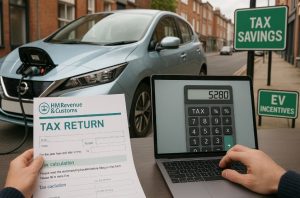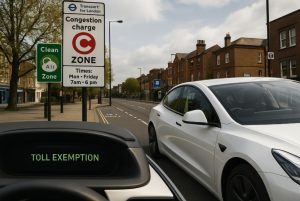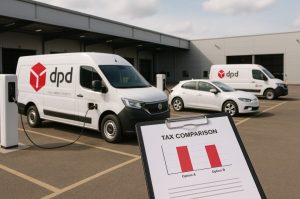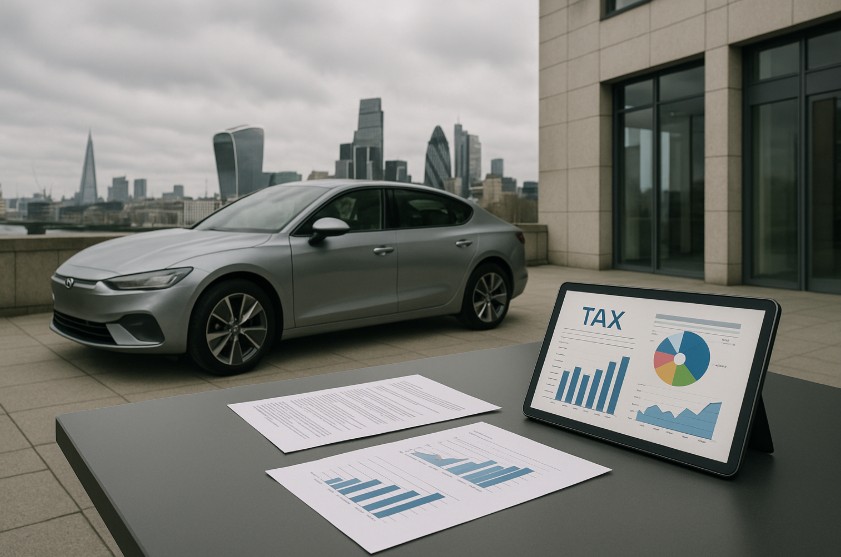The UK is accelerating its transition to electric vehicles, driven by environmental goals and updated government policies.
With key tax changes introduced in April 2025, understanding the financial benefits of electric cars has never been more important.
From reduced Benefit-in-Kind rates to capital allowances and grants, electric vehicles offer significant incentives for both individuals and businesses.
This guide explores the most up-to-date tax advantages available in 2025, helping UK drivers make informed decisions when switching to electric transport.
What Are The Current Electric Car Tax Benefits In The UK For 2025?

The UK government has introduced several tax-related incentives to promote the adoption of electric vehicles (EVs).
These incentives are particularly appealing in 2025, as certain tax benefits are still available but are scheduled to be phased out in the near future.
The Zero Emission Vehicle (ZEV) Mandate sets annual targets for manufacturers, ensuring a growing share of new vehicles sold are electric. For 2025, the targets are:
- 28% of new car sales must be zero emission
- 16% of new van sales must be zero emission
Electric vehicles provide savings in multiple tax categories including Benefit-in-Kind (BIK), Vehicle Excise Duty (VED), capital allowances, and salary sacrifice schemes.
How Does Benefit-In-Kind Tax Apply To Electric Vehicles?
Benefit-in-Kind (BIK) is a tax on employees who receive perks or benefits from their employer, including company cars. The amount of BIK tax paid depends on a vehicle’s CO2 emissions and its list price.
EVs offer a much lower BIK tax compared to petrol or diesel cars. As of the 2025/26 tax year, the BIK rate for fully electric vehicles is 2%.
The table below shows a direct comparison between similar electric and petrol vehicles:
| Vehicle Model | Engine Type | List Price | BIK Tax Per Year (20%) |
| BMW iX3 M Sport | Electric | £64,165 | £268 |
| BMW X3 xDrive20i M Sport | Petrol | £47,160 | £3,552 |
| Volvo XC40 Recharge | Electric | £46,505 | £186 |
| Volvo XC40 B3 | Petrol | £35,895 | £2,464 |
Key details:
- EV BIK rates are locked at 2% until at least the end of the 2025/26 tax year
- The tax is based on the list price, not purchase price
- Employers must report BIK via a P11D or payroll
What Is The Impact Of Company Electric Cars On Business Tax?

When a business purchases an electric vehicle for use in its operations, it can access a number of valuable tax deductions.
Primary advantages include:
- 100% first-year capital allowances on new, unused electric cars
- Reduced employer National Insurance due to lower BIK for employees
- VAT relief on business-related expenses
To qualify, the vehicle must be:
- Fully electric
- Purchased new and unused
- Used for business purposes
These deductions help businesses offset the upfront cost of EVs, improving overall tax efficiency.
Can UK Businesses Claim Capital Allowances On Electric Vehicles?
Yes, businesses can claim 100% first-year capital allowances on eligible electric vehicles. This allows them to deduct the full cost of the vehicle from their profits before calculating corporation tax.
Requirements:
- Vehicle must be new and not previously used
- Must be fully electric (not a plug-in hybrid)
- Claimed in the same year the vehicle is bought
This tax relief is unavailable for used or hybrid vehicles purchased from April 2021 onwards.
Are Electric Vehicles Exempt From Road Tax And Other Charges?

Electric vehicles used to be exempt from Vehicle Excise Duty (VED), but this changed from April 2025.
The current road tax system for electric vehicles is as follows:
| Registration Date | Annual VED | Notes |
| From 1 April 2025 | £10 (Year 1), then £195 annually | First-year rate applies once |
| 1 April 2017 – 31 March 2025 | £195 annually | Applies to all qualifying EVs |
| 1 March 2001 – 31 March 2017 | £20 annually | Based on legacy tax bands |
| EVs over £40,000 | +£425 per year | Applies from Year 2 to Year 6 |
Additional Information:
- EVs are still exempt from Congestion Charges and Clean Air Zone (CAZ) charges until December 2025
- The £40,000 ‘expensive car’ surcharge now applies to electric cars registered from 1 April 2025
These changes highlight the UK government’s transition away from tax exemptions as EV adoption becomes more widespread.
What Tax Benefits Come With Electric Car Salary Sacrifice Schemes?
Salary sacrifice schemes allow employees to lease an electric car using a portion of their gross salary, which reduces taxable income and National Insurance contributions.
Main benefits include:
- Savings on income tax and National Insurance
- Access to new electric vehicles without large upfront costs
- Low BIK tax of just 2%
For employers, offering EVs through a salary sacrifice scheme can:
- Improve staff retention and satisfaction
- Demonstrate a commitment to sustainability
- Reduce Class 1A National Insurance liabilities
The combination of low BIK and reduced payroll taxes makes salary sacrifice a tax-efficient way to encourage EV use.
Do Home And Workplace EV Chargers Offer Tax Relief?
The cost of installing and using EV charging infrastructure may be eligible for tax relief depending on where and how it is used.
For employees:
- If you charge a company car at home using a charger installed and paid for by your employer, there is no BIK tax
- Charging a personal vehicle at work is not taxable if the charge point is:
- At or near the workplace
- Available to all employees
For employers:
- VAT can be reclaimed on charging infrastructure if used for business purposes
- Installation costs can be covered by government grants (covered later)
Charging reimbursements from employers to employees for home electricity use may be taxable, but employees can often claim mileage relief.
What Are The Differences In Tax For Electric Vans Vs. Cars?

Electric vans benefit from similar, and in some cases more generous, tax advantages compared to electric cars.
Key differences:
- Van Benefit Charge: Electric vans used only for business (or minimal private use) are exempt from this charge
- Capital Allowances: 100% first-year allowances available for new electric vans
- Charging Costs: No fuel benefit charge since electricity is not considered a fuel
This makes electric vans particularly attractive for logistics firms, contractors, and other commercial operators.
How Do HMRC Rules Affect Electric Vehicle Taxation?
HMRC provides detailed guidance on how businesses and individuals should report and account for tax on EVs.
Key points:
- Advisory electricity rate for EVs is currently 8p per mile (as of June 2024)
- Accurate mileage logs are required when claiming tax relief
- EV-related benefits such as charging at work must meet specific criteria to avoid BIK tax
HMRC also offers online forms and tools to help employers determine if benefits are taxable. Employers must maintain full compliance by ensuring all benefits, mileage, and allowances are properly recorded and reported.
What Government Grants And Tax Breaks Are Available For EVs In 2025?
The UK government offers several grants through the Office for Zero Emission Vehicles (OZEV), targeted at both individuals and businesses.
| Grant Name | Eligibility | Maximum Support | Deadline |
| EV Chargepoint Grant | Homeowners | £350 or 75% of installation cost | Ongoing |
| EV Infrastructure Grant | Landlords & Housing Providers | £30,000 or 75% of cost | March 2025 |
| Workplace Charging Scheme | Businesses & Charities | £350 per socket, up to 40 sockets | 2025 |
To qualify, applicants must meet certain criteria related to location, usage, and installation standards.
These grants offer further incentives for individuals and organisations looking to transition to electric transport before the end of available support.
Conclusion
In 2025, electric vehicles continue to offer a wide range of tax benefits to both businesses and individual drivers. From reduced BIK rates and capital allowances to exemptions from road tax and congestion charges, the financial incentives for switching to electric are substantial.
However, as the UK transitions towards a fully electric future, some of these perks are beginning to phase out. Acting quickly to take advantage of the remaining incentives could lead to significant long-term savings.
Electric vehicles are no longer just a sustainable choice—they’re also a strategic financial move for UK drivers.
FAQs
What is the current Benefit-in-Kind rate for electric vehicles?
The BIK rate for electric vehicles in the UK is 2% for the 2025/26 tax year.
Can I claim VAT on an electric company car?
Yes, businesses can claim 50% of the VAT on electric vehicles used for business, and 100% on charging costs if the vehicle is used solely for business purposes.
Do EVs still qualify for government grants in 2025?
Yes, several grants are still available, including the EV Chargepoint Grant and the Workplace Charging Scheme. However, many of these are set to end by 2025.
Are electric vehicles still exempt from road tax?
No. From April 2025, newly registered EVs are subject to road tax starting at £10 in the first year and £195 annually thereafter.
How does the salary sacrifice scheme for EVs work?
Employees can exchange part of their salary for an EV lease, reducing their income tax and National Insurance contributions, while benefiting from low BIK rates.
Is electricity considered a taxable fuel by HMRC?
No, electricity is not classified as a fuel by HMRC, meaning there is no fuel benefit tax for electric vehicles.
What happens if I charge my personal car at work?
If the charging point is provided at or near the workplace and is available to all staff, no BIK arises—even if it’s your personal car.








